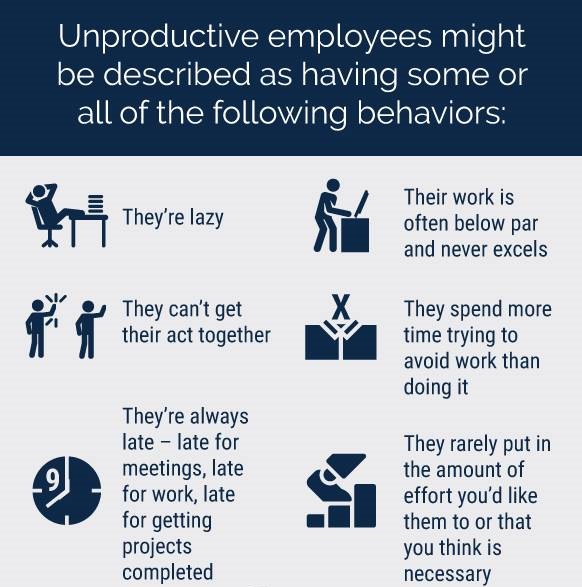
Articles
How to Manage Unproductive Employees Without Hurting Morale

Do you ever feel like your business is being dragged down by unproductive employees? If so, it’s time to take action. Learning how to manage unproductive employees can be a tricky task, but with the right approach and strategy in place, you can help ensure that everyone on your team is contributing equally.
In this blog post, we will explore how to manage unproductive employees and address this behavior without sacrificing productivity or morale.
Why is Workplace Productivity Important?
Workplace productivity is an important factor in any business. It helps to ensure that tasks are completed on time and with the highest quality of work. When employees are productive, they feel a sense of accomplishment and pride in their work which leads to higher morale and job satisfaction.
Increased productivity also helps businesses save money by reducing costs associated with wasted time or materials due to poor employee performance. With fewer resources being used up, businesses can invest more in other areas such as marketing or research and development.
Employee productivity is also linked to overall workplace culture. When workers have a positive attitude towards their jobs, it creates an environment where everyone feels valued and respected for their contributions. This increases motivation levels so that everyone works together towards common goals.
Finally, having productive employees means there’s less stress on managers who don’t need to constantly monitor progress or worry about deadlines. This allows company leaders to focus on bigger-picture objectives rather than micromanaging every task at hand.
But what if you have unproductive employees? How to manage unproductive employees and turn them into rockstars?
How to Spot Unproductive Employees
Unproductive employees can be difficult to spot, but there are certain signs that can help you identify them.
Poor performance is the most obvious sign of an unproductive employee. This could include a lack of focus, missed deadlines, and low-quality work.
Other signs may include excessive absences or tardiness, difficulty completing tasks on time, and a general lack of motivation or enthusiasm for their job.
There are many potential causes for unproductivity in the workplace. These could include poor management practices such as inadequate training or unclear expectations, personal issues such as stress or health problems, or even boredom with their current role.
It’s important to take the time to understand why an employee might be struggling before taking any action against them.
By establishing clear expectations, providing feedback and support, and setting goals and deadlines, managers can create an environment that encourages higher levels of performance.
How to Address The Behavior
To ensure that all team members understand what is expected of them in terms of performance, managers should clearly define roles and responsibilities for each position. This will give employees a better understanding of how their work contributes to the overall success of the organization.
Managers should also make sure that all tasks have achievable timelines so that everyone knows when things need to be completed.
Regularly providing feedback helps keep employees engaged in their work and allows them to see where they stand in terms of performance. Positive reinforcement encourages good behavior while constructive criticism helps identify areas for improvement so that issues can be addressed quickly before they become bigger problems.
If you have a struggling employee, try offering additional training or resources to help them get back on track with their workload.

How to Manage Unproductive Employees
If you want to motivate unproductive employees, the key is to develop an action plan that helps increase employee productivity.
To manage lazy employees, set clear expectations, provide feedback on their progress, and outline consequences if they fail to meet those expectations. Be sure to provide resources such as training or coaching so that nonproductive employees can improve their skills and be successful in their roles.
Once you have developed an action plan, it’s time to start implementing performance improvement plans (PIP). These are designed to help identify areas where the employee needs improvement and set goals for how they can achieve success in those areas. They should also outline specific steps that need to be taken by both the employer and employee in order for these goals to be met.
Finally, it is important to monitor progress regularly and adjust strategies as needed. Regular check-ins with employees are essential so that any issues can be addressed quickly before they become bigger problems.
By taking proactive steps to manage employee productivity, businesses can prevent future issues with unproductive employees by creating an engaging work environment that encourages collaboration and offers training and development opportunities.
How to Boost Productivity in the Workplace
Creating an engaging work environment is essential to keep happy employees. This can be done by providing a comfortable and pleasant workspace, offering flexible working hours, encouraging collaboration, and recognizing employee achievements. As managers, it is important to create an atmosphere of trust and respect so that everyone feels valued and appreciated.
Offering training and development opportunities is also important for increased productivity. Opportunities for learning new skills or honing existing ones can motivate employees and give them a sense of accomplishment when they master something new.
Additionally, having access to resources such as online courses or webinars will help keep their knowledge up-to-date with industry trends which could prove beneficial for both the employee and the business in the long run.
FAQs About How to Manage Unproductive Employees
How do you handle an unproductive employee?
- Try to understand the reason behind the behavior.
- Encourage them to make time tracking a habit.
- Strive to maintain healthy attitudes within the team.
- Use training as an incentive.
- Make them face the possible consequences.
How do you manage an unproductive team?
- Help everyone stay organized with a project management tool.
- Make sure everyone has a productive working environment.
- Streamline your team's tasks.
- Ensure you're hiring the right people for the job.
- Encourage your staff to give you honest feedback.
How do you motivate an unproductive team?
- Restructure jobs.
- Focus on relationships.
- Make it meaningful.
- Set goals and celebrate them.
- Treat them like adults.
- Offer regular recognition.
- Tie rewards to results.
- Think small, but creative.
How do I tell my employee to be more productive?
- Identify the root cause of the lack of performance.
- Clearly outline the expected behavior.
- Have a private one-on-one meeting.
- Encourage the employee to focus on self-evaluation.
- Manage your emotional intelligence.
- Offer training and mentorship.
Conclusion
It's important to remember that how to manage unproductive employees is a delicate process. You want to ensure that you are addressing the issue in a way that is fair and respectful, while also making sure your business runs smoothly.
By following the steps outlined above, you can create an environment where everyone feels valued and respected, while still being able to manage productivity effectively. With clear expectations and consistent communication, businesses of all sizes can ensure their teams are productive and successful.
Are you struggling to manage unproductive employees? Trainual is here to help. Our comprehensive training and onboarding solutions will equip your business with the tools it needs for success.
We'll provide guidance on how to document processes, policies, and experiences that promote productivity among your team members while also helping entrepreneurs, founders, managers, and operational leaders scale their businesses efficiently. With our expertise, you can rest assured knowing that all of your personnel are meeting their goals!
Similar Blog Posts







